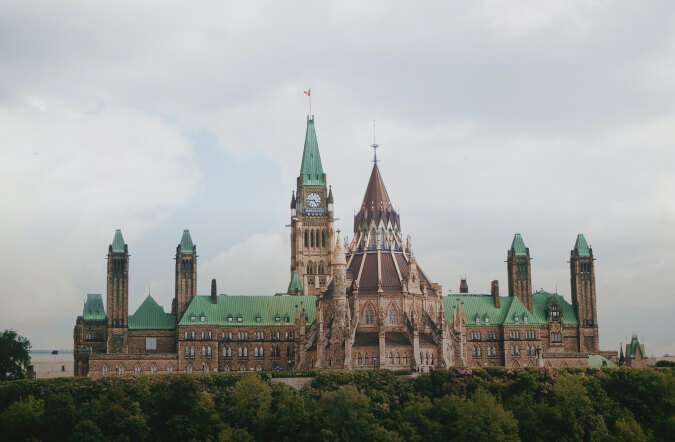What is Responsible Government?
In a representative democracy such as Canada, voters elect MPs to represent them in the House of Commons. The political party that wins the most seats in a federal election is usually given the opportunity to form the government.
A confidence vote is a vote that determines whether the government has the support of the House of Commons. Votes on certain matters – such as the budget and the Speech from the Throne (the speech that opens each session of Parliament, in which the government outlines its upcoming priorities) – are automatically considered votes of confidence. The government may also designate a specific vote as a confidence vote. Opposition MPs can also request a vote of confidence through a motion (a proposal for an action that requires a decision from the House of Commons).
Traditionally, if a government loses a confidence vote, the Prime Minister and Cabinet will resign or ask the Governor General to dissolve Parliament. A federal election is then held. The Governor General can also call on the leader of the largest opposition party to try to form a new government, instead of having an election.
The Role of the Opposition
In the House of Commons, the opposition is made up of MPs who do not belong to the governing party: members of other political parties, as well as independent members.
The Official Opposition is the political party that has the second-highest number of MPs elected to the House of Commons. The leader of this party is called the Leader of His Majesty’s Loyal Opposition, often informally referred to as the Leader of the Opposition.
In the chamber, MPs from the governing party and opposition MPs usually sit facing each other. The opposition parties form shadow cabinets – groups of opposition MPs, called critics, who are responsible for the same areas of expertise as the governing party’s Cabinet ministers. Having them sit in a mirror image of each other is a reminder that one side can potentially replace the other at any time.
The role of the opposition is to challenge government policies, hold the government accountable for its actions and give voters an alternative in the next election. These roles are often highlighted during Question Period.
Question Period
Question Period in the House of Commons
Question Period (officially known as Oral Questions) is the time of day in the House of Commons when MPs ask the government questions about its activities. It provides an opportunity for opposition parties to publicly address concerns and hold the government accountable.
Question Period can be a lively time in the chamber. Questions are asked and answered in quick succession, and exchanges can get heated as each side passionately defends or attacks their different positions. It begins at 2:15 p.m. (11:15 a.m. on Fridays) and lasts for 45 minutes. It is usually the busiest time of day in the House of Commons Chamber.
Watch Question Period in the House of Commons
Before Question Period begins, each party decides which MPs will ask questions. They give the Speaker a list of names, and the Speaker decides who will speak next. The Leader of the Opposition often asks the first question, followed by other opposition, government and independent members until the time runs out.
Questions can be directed to the Prime Minister, a Cabinet minister or a committee chair, through the Speaker. Ministers may choose to answer themselves or defer their answer to another minister or a parliamentary secretary. They can also explain why an answer cannot be given or choose not to answer. MPs who are unsatisfied with a response can request that the issue be raised again at the end of the day during Adjournment Proceedings.
When Question Period is over, MPs often enter a media scrum outside the chamber, where journalists gather to ask questions and record short interviews. Issues raised during Question Period can lead to media interviews, where government and opposition MPs explain their positions in more detail.
Question Period and all House of Commons proceedings are broadcast on television and can be viewed online. Their words are recorded in Hansard, the official record of what is said in the House of Commons.
Question Period in the Senate
The rules and traditions of responsible government in the House of Commons do not apply to the Senate. Senators are appointed and can choose their affiliation – some belong to a parliamentary group or political party that mirrors the parties in the House of Commons, and some do not. A change in government does not directly affect the makeup of the Senate after an election.
During the Senate Question Period, senators have 30 minutes in total to ask questions to specific senators on items that relate to their roles. Senators who might be questioned include:
- the Government Representative in the Senate
- a senator who is also a Cabinet minister about that senator’s ministerial responsibilities
- a committee chair about the committee’s activities
Watch Question Period in the Senate
The tone and type of questions in Question Period in the Senate differ from those in the House of Commons. The questions tend to be shorter, and the responses concise. Most questions are directed to the Government Representative in the Senate.
